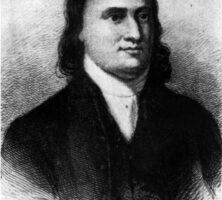Button Gwinnett was one of three Georgia signers of the Declaration of Independence. He served in Georgia’s colonial legislature, in the Second Continental Congress, and as president of Georgia’s Revolutionary Council of Safety.
Gwinnett was born in April 1735 in Gloucestershire, England, the son of Anne and the Reverend Samuel Gwinnett. He married Ann Bourne in 1757, and they had three children—Amelia, Ann, and Elizabeth Ann.

Courtesy of Hargrett Rare Book and Manuscript Library, University of Georgia Libraries.
Gwinnett arrived in Savannah in 1765 and became a merchant. After this venture failed, he purchased St. Catherines Island and set himself up as a planter. He became active in local politics, winning election to the Commons House of Assembly in 1769. By 1773 Gwinnett was again in financial straits; he sold most of his personal property and possessions and withdrew from the political scene.
The Revolutionary crisis brought him back into politics. Gwinnett rallied the opponents of the Christ Church Parish–led Whig Party, which until that time had dominated the leadership in the emerging dispute with the British crown. He succeeded in uniting coastal and rural dissidents into a loose coalition that demonstrated its strength by electing Gwinnett commander of Georgia’s Continental battalion when the state’s Provincial Congress met in early 1776. When his election proved controversial, Gwinnett stepped aside and accepted instead an appointment to the Continental Congress, then meeting in Philadelphia, Pennsylvania. Lachlan McIntosh commanded the battalion in Gwinnett’s stead, and these two would become bitter enemies.
In Philadelphia, Gwinnett served on a number of committees and supported separation from England. He voted for independence in July, signed the Declaration of Independence in August (along with other Georgians George Walton and Lyman Hall), and soon afterward returned to Georgia, where he became embroiled in political controversy.
Disappointed in his military ambitions, Gwinnett continued to lead the opposition to the Christ Church Parish coalition, and when his followers gained control of Georgia’s Provincial Congress, they succeeded in electing him Speaker. He played a key role in the passage of the Constitution of 1777 and began to purge the military of officers whom he and his followers deemed less than zealous in their enthusiasm for the Whig cause. This brought him into conflict with Lachlan McIntosh. After the death of Georgia’s president and commander-in-chief, Archibald Bulloch, in February 1777, the Council of Safety appointed Gwinnett to succeed him.
Gwinnett proposed a military foray into British East Florida, a defensive measure that he argued would secure Georgia’s southern border. McIntosh and his brother George (who had opposed Gwinnett’s election as president and subsequently had been arrested for treason) condemned the scheme as politically motivated. The expedition failed, and though he was not elected governor when the new legislature met in the spring of 1777, Gwinnett was exonerated of any misconduct in carrying out the campaign.
McIntosh was furious. He publicly denounced Gwinnett in the harshest terms, and Gwinnett challenged him to a duel. Though each man shot the other, only Gwinnett’s wound proved fatal. He died on May 19, 1777, and was buried in Savannah’s Colonial Park Cemetery, though the exact location of his grave is unknown. Gwinnett County was named for him when it was established in 1818.
Gwinnett’s signature is one of the rarest and most valuable of the signers of the Declaration of Independence. (Georgia historian Charles C. Jones Jr. collected an entire set of autographs by the signers of the Declaration, including Gwinnett’s holograph will.) In 1979 a letter signed by Gwinnett brought $100,000 at a New York auction. In 2012 a document bearing Gwinnett’s signature was valued between $700,000 and $800,000.








